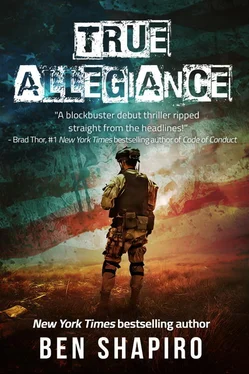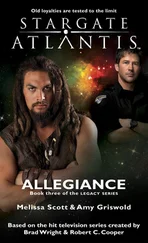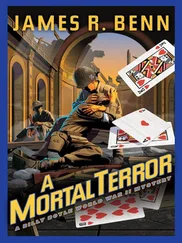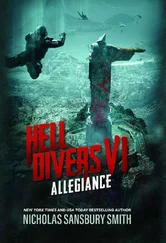“But at least they won’t be runnin’ around the state in their helicopters. Power to arrest means power to fire on those who are a threat.”
Prescott’s voice went ice cold. “Let me be perfectly clear, Governor Davis. Your boys shoot anybody, and I’ll have my DOJ dogs down there sniffing around you like you’re a bitch in heat.”
Another pause. “And then what?”
Prescott was thunderstruck. “And then what? And then I arrest your boys, shut down your operation, and bring charges against you for violation of federal law. That’s what.”
A long pause, this time. Softly. “And then what?”
“I don’t have time for this bullshit, Bubba. You cross me, and I promise, you’ll see the inside of a cell for a very, very long time.”
Davis’s voice came through solidly. “I read you loud and clear, Mr. President.”
The phone clicked dead.
Prescott buzzed the intercom. “Marissa, get me Jazz.” That was his nickname for Jasmine Jacks, the national security advisor, his longtime political mentor.
He could hear her sexy fingers manipulating the phone. “She’s in the Situation Room, Mr. President. And she says you might want to get down there. Something about Brett Hawthorne.”
Ellen

Austin, Texas
BRETT HAD LOST WEIGHT.
Funny that that would be the first thought to cross Ellen’s mind when she saw him on television, but it was. He was always so self-conscious about the four or five pounds around his midsection he couldn’t shake, what he liked to call the Famed Hawthorne Underbelly. That had to be gone. He looked gaunt. That jutting jawline she loved to kiss looked like skin stretched taut over bone. He looked like death. That was her first thought.
Her second thought was that this could not be happening.
Her man. The man she’d married and who had cared for her and who had provided her strength and to whom she’d given her entire life—a man she had never questioned about his honor, even when the front pages of every major newspaper in America smeared it—with a knife to his throat.
She was alone, watching him. He was alone, at the mercy of his enemies. This couldn’t be real.
But there he was, his eyes staring out stolidly at the camera, wearing an orange jumpsuit, his face a mask of impassivity. Ellen knew one version of that look—the stubborn look that came into his eyes when they had an argument and he set his mind that he was in the right. When that look came over his face, the argument was over, even if he was dead wrong.
But the glassy stare that masked Brett’s stubbornness—that she hadn’t seen before. It had to be trained into you, she imagined. Nobody looked like that naturally.
Of course, it wasn’t exactly natural to have a knife to your throat, either. And that’s what the networks showed over and over, on a loop: Brett, on his knees, in that orange jumpsuit, with a man swathed totally in black, his face wreathed in material, a knife in his hand and at Brett’s throat. He spoke with a British accent, although the facecloth made it impossible to know whether or not the voice came from him.
It all felt surreal. They’d released videos like this before. But never of Ellen’s husband.
“The blood of innocents is on your hands, President Prescott,” the masked figure stated in monotone laced with fanatical passion. “As you bomb our innocents, so we strike at the throats of your people. In the name of Allah, the most high, we will send you your general’s head if you fail to withdraw your bombers within forty-eight hours.”
The video cut to black.
Then, the face of the president, grim and obviously weary: “We will not bow before terrorists. “
The media didn’t take long to descend on Ellen’s home outside of Austin, looking for comment. She obliged them, because she knew Brett would want her to. He had always told her that to run from the media was a waste of time—they’d print something anyway, true or false. So she told them that she wouldn’t beg, and neither would her husband. While members of the administration urged her to issue a plea to the terrorists for mercy, she refused. She knew the look in her husband’s eye well enough to know that pleading with terrorists was out of the question. And she knew it was useless anyway.
They would kill him.
She had seen the end of videos like this before. The first installment represented the threat; the second installment, invariably, represented the fruition of that threat. The jagged trunks of human beings, the sawed-off heads that looked too much like a horror movie and not enough like real life.
Her husband.
She reached out to the television, stroked his cheek. The cheek that had laid on her breast the first night they made love. The cheek that she had wet with tears the night of the miscarriage. His eyes blinked rapidly as she stroked the screen, almost as if he could feel her touch him across the world.
She felt tears well in her own eyes.
She couldn’t cry. Not yet.
So she went to work as usual.
When she arrived at the capitol, she made straight for the governor’s office. The halls were thronged with angry Texans—and angry Texans were anything but subtle. Some carried signs tacked to wooden planks: “CLOSE THE BORDER!” “ENOUGH IS ENOUGH!” “PROTECT YOUR PEOPLE!” She edged her way past one burly linebacker of a man, wearing a cowboy hat and a gun, which was perfectly legal in the state. That was reason enough for Ellen to love the Lone Star State. There wouldn’t be any random shootings in this capitol building anytime soon, even if the media made it seem as though every civilian with a gun represented a threat to public safety. For every nut with a gun, she knew, there were ten willing to put him down.
She showed the guards her ID, and they waved her through. Two knocks on the door, and she stood across from onetime Republican presidential candidate and four-time governor Bubba Davis. After a stint in Vietnam back in the late 1960s, Davis—a big bear of a man, burly and fun loving—had come home without a job. He’d finally gotten one working on an oil rig. He loved the work, the feel of the equipment in his hands, and after a while, he felt good enough to go out on his own, with a bit of a bankroll from his dad-in-law. He lived frugally—and then struck it rich when he patented a new drilling technique that skyrocketed efficiency. Soon, Bubba Davis was one of the richest men in the state. So when his friends pushed him to run for state legislature, he hesitated—why give up the Dynasty life for backroom deals with cigar-smoking lawyers?
He hesitated until his local state assemblyman began calling for new environmental reviews of all drilling. The way Bubba figured it, he had no choice—his livelihood, and the livelihood of his workers, was at stake. He ran. He won. And he kept on winning. Turned out that his blunt nature and blustery personality worked great. His first campaign slogan: “Don’t Let ’Em Hornswoggle You.” In his opening campaign speech, he named the three top environmental officers in the state and read off how much they’d received from lobbyists for the environmentalists—and how much those environmental groups received from global competitors like the Saudi government.
Bubba Davis played politics like he played football: he pushed the line. The press called it “swagger.” He just called it the Texas Way.
Now, though, the governor of Texas’s face lit with rage. The man who had once picked up fellow soldiers and thrown them over his shoulder in distant rice paddies had turned to soft fat. Since Marge died, Bubba Davis drank too much, smoked too many cigars. And when he got angry, his face turned candy-apple red.
Читать дальше













